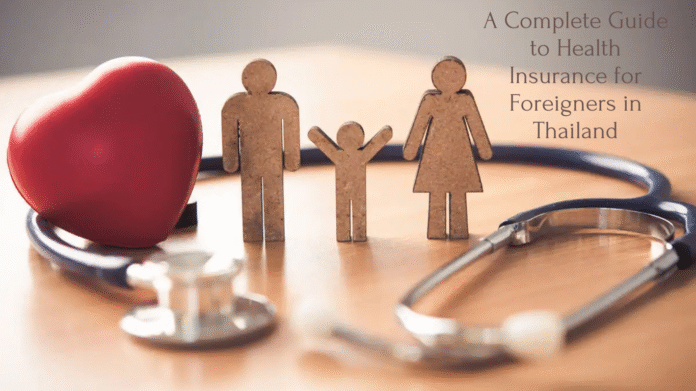Choosing the Right Health Insurance
Living in Thailand as a foreigner requires proper medical coverage. Healthcare plans in Thailand come in many forms. Each option provides unique benefits and varying levels of coverage. People who move abroad can use this awareness to select their medical services prudently. Medical coverage brings comfort to foreigners navigating unfamiliar settings. People need to protect themselves against unpredictable medical bills.
Thailand’s healthcare system meets high international standards. Medical expenses escalate rapidly when foreign nationals do not obtain health insurance coverage. Many expats discover this only after facing an emergency. Planning with proper international health plans saves both money and stress during difficult times. Quality healthcare exists throughout the country. Insurance makes it accessible and affordable for foreign residents.
Available Health Coverage Options
Thailand offers several types of insurance for foreign residents. Local insurance plans provide basic coverage at affordable rates. International health programs deliver more comprehensive benefits with wider acceptance across medical facilities throughout the country. Each plan type serves different purposes. Understanding the differences helps you choose wisely.

Each option suits different needs and budgets. Local plans work well for those staying short-term. International health strategies better serve long-term expats needing broader protection. These plans often include evacuation coverage and treatment abroad. Making the right choice depends on your specific situation and health requirements throughout your stay. Your lifestyle and travel habits should play a key role in your decision. Consider your health history when comparing options.
Local Thai Insurance Options
Thai insurance companies offer policies specifically for foreigners. These plans are usually more affordable than international alternatives. They cover treatment at both public and private hospitals within Thailand’s borders. Local insurers understand the Thai healthcare system well. They design plans specifically for the local market.
Most local plans include outpatient services and hospitalization. Some plans include optional add-ons like dental and vision coverage. Thai insurance policies often have lower annual limits. This makes them suitable for healthy individuals without ongoing conditions. Always check hospital networks before purchasing a local plan to ensure convenient access. Language barriers rarely cause problems with local plans. Many providers offer English-language support services.
International Health Plans for Global Coverage
International health plans provide wider coverage beyond Thailand. These plans work in multiple countries and healthcare systems. They offer higher coverage limits and more comprehensive benefits for serious conditions. Global coverage matters for frequent travelers. These plans follow you wherever you go.
Many expats prefer international health techniques for peace of mind. These policies cover evacuation services during emergencies. They also allow treatment in home countries during visits. Premium costs run higher than local options. The extended benefits justify the price for many long-term expats concerned about quality care. Coverage continues even when traveling outside Thailand. This feature particularly benefits digital nomads and business travelers.
Government-Required Insurance Policies
Thailand now requires certain visa holders to maintain health insurance. Applicants for a retirement visa are required to provide proof of insurance coverage. This policy ensures foreigners won’t burden the public healthcare system with unpaid medical bills. These requirements protect both visitors and the healthcare system. Compliance prevents visa problems later.
The required coverage includes both inpatient and outpatient treatment. Minimums include 400,000 baht for inpatient and 40,000 for outpatient care. These requirements change periodically with government regulations. Always check current regulations before applying for or renewing visas. Many insurance providers offer specific packages meeting these requirements exactly. Embassy websites provide updated information. Insurance certificates must sometimes follow specific formats.
Comparing Costs and Benefits
Insurance costs vary widely based on several factors. Age, medical history, and coverage levels affect premiums. Basic plans start around 20,000 baht annually for younger applicants. Comprehensive coverage can exceed 100,000 baht per year for older expats. Price differences reflect coverage quality. Budget options limit benefits significantly.

Comparing benefits requires looking beyond just price. Consider deductibles and co-payment amounts carefully. Check annual and lifetime maximums before deciding. Review exclusions and waiting periods for pre-existing conditions thoroughly. The cheapest plan rarely provides the best value for foreigners settling in Thailand long-term. Some plans cap certain treatments. Others limit hospital choices to lower-tier facilities.
Coverage for Pre-existing Conditions
Finding coverage for pre-existing conditions challenges many expats. Most basic plans exclude these conditions entirely. More comprehensive international health plans may cover them after waiting periods of 12-24 months. Disclosure requirements vary between providers. Honesty prevents claim denials later.
Some insurers offer coverage with premium loading for existing conditions. This means higher payments for including specific health issues. Others cover acute episodes but not ongoing treatment. Age affects these policies significantly. Those over 60 face more restrictions and higher costs for pre-existing condition coverage. Medical underwriting determines final terms. Some conditions receive permanent exclusions regardless of waiting periods.
Hospital Networks and Provider Access
Insurance plans limit treatment to specific hospital networks. Premium plans offer access to Thailand’s top private hospitals. Basic plans may restrict options to government facilities or smaller clinics with fewer specialists. Network size affects convenience significantly. Rural residents should check local hospital participation.
Understanding network limitations prevents surprise bills. Top international hospitals like Bumrungrad and Bangkok Hospital accept most major plans. Smaller provincial hospitals have more limited insurance acceptance. Always verify that your preferred hospitals work with your chosen insurance provider before purchasing any policy. Some plans offer tiered benefits by hospital class. Others provide nationwide access without restrictions.
Special Considerations for Retirees
Retirees face unique challenges in securing medical insurance in Thailand. Most providers cap enrollment age at 70 or 75 years. Premiums increase substantially with age after 60. Many seniors face coverage limitations. Planning prevents problems later.
Long-term planning helps manage these rising costs effectively. Some retirees combine local coverage with insurance from their home countries. Others self-insure for minor issues while maintaining catastrophic coverage only. Government retirement visa requirements make some level of coverage mandatory regardless of personal preference. Age-specific plans exist for retirees. Some providers specialize in senior coverage options.
Digital Nomads and Short-term Coverage
Digital nomads need flexible health care solutions. Travel insurance serves those staying under six months well. Specialized nomad insurance combines elements of travel and health coverage for location-independent workers. Flexibility matters for mobile lifestyles. Coverage should match travel patterns.

These plans offer renewable terms without long commitments. They typically include emergency evacuation benefits. Coverage for laptops and work equipment adds value for remote workers. Most plans exclude treatment for pre-existing conditions entirely. Always verify that territorial limits match your planned travel schedule throughout Southeast Asia. Border-hopping affects coverage validity. Multi-country policies cost more but provide better protection.
Application Process and Documentation
Applying for the health plan for foreigners requires specific documentation. Passport details and visa information form the basics. Medical questionnaires assess health status and risks for accurate pricing. Honest disclosure prevents future claim disputes. Application processing times vary seasonally.
Most providers offer online application systems for convenience. Processing typically takes 3-7 business days for approval. Some plans require medical examinations before approval. Others implement waiting periods instead of examinations. Keep copies of all policy documents and emergency contact information easily accessible. Digital copies help during emergencies. Insurance cards should always accompany travelers.
Making Claims and Receiving Treatment
Understanding the claims process prevents problems during medical emergencies. Direct billing arrangements simplify hospital visits considerably. Many facilities handle insurance paperwork directly with providers so patients can focus on recovery. Knowing procedures beforehand reduces stress. Emergency hotlines provide guidance when needed.
Reimbursement claims require detailed documentation from medical providers. Keep all receipts and medical reports organized carefully. Most insurers offer claim submission through online portals or mobile apps. Processing times vary from days to weeks, depending on complexity. Follow up regularly on outstanding claims to ensure proper resolution. Claim denials can be appealed. Documentation strengthens your position during disputes.
Making the Right Choice for Your Health Needs
Choosing the right medical insurance creates security while living abroad. Health insurance for foreigners in Thailand continues evolving with changing regulations. International health plans offer extensive benefits for those needing global coverage. Local options provide cost-effective alternatives for Thailand-based care without excess features. Regular policy reviews ensure ongoing suitability. Insurance needs change as circumstances evolve.
Research thoroughly before making this important decision. Consider both immediate needs and long-term health scenarios. Compare multiple providers before signing any contracts. Proper coverage allows you to enjoy Thailand’s beauty without constant health worries. Follow DP world news for more about health topics and insurance options for expats. Expert advice simplifies complex decisions. Having peace of mind comes when you understand your protection is sufficient.





